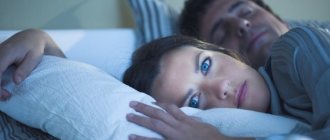The most important and at the same time the most mysterious process in the human body has gathered a lot of rumors and guesses. Scientists in sleep research laboratories are trying to understand the nature of this process so that we can have an understanding of how sleep works and how much sleep we actually need to get enough sleep.
In the first lesson of this course, we will talk about how falling asleep begins and what processes in the human body occur at the border of wakefulness and sleep.
The purpose of the lesson: to find out what the process of falling asleep is, what a dream consists of, and how the brain knows that it is time to wake up.
We will also find out what time you need to fall asleep and wake up and why. We suggest moving sequentially through each point of all sleep processes, so that at the end you have a complete picture and no questions left. Therefore, let's start by finding out how it turns out that a person begins to fall asleep and what processes are responsible for this.
What is sleep
One of the important physiological states of a person is sleep. The need to sleep arises regularly. After all, at this time the human body is in relative peace, while sensitivity to external influences is significantly reduced compared to the period of wakefulness.
A person looks like a machine put into “sleep mode”, as he is:
- in a stereotypical pose;
- with a minimum of physical activity;
- with a reduced reaction to external stimuli.
The higher parts of the nervous system are responsible for the physiology of sleep. The nerve cells of the cerebral cortex are capable of responding to the slightest irritation coming from the external environment and forming inside a person. They are constantly on guard, sending signals to human organs and muscles. Such reactivity leads to gradual fatigue and inhibition of their activities. That's why people sleep.
And when a person has worked during the day, is tired or has suffered from illness, then in the evening his eyes are irresistibly closed. If at this moment the activity of only the cerebral cortex is inhibited, then sleep is not sound. Having descended to the lower parts of the brain, inhibition leads to deep sleep. It is known why a person falls asleep to the ticking of a clock, the clatter of train wheels, or monotonous speech. In these cases, inhibition prevails over excitation, and sleep comes.
Today the Lifext team will tell you:
- A little history
- Why are we sleeping? Why is sleep the foundation of the body?
- How does sleep affect lifespan and brain health?
- Is urbanization undermining our bodies? What are circadian rhythms?
- Who are owls and larks? Do they really exist?
- Tips for improving sleep quality.
- Lifext Recommendations
Functions
Sleep control is carried out by complex processes occurring in the nervous and endocrine systems. Substances that transmit impulses from nerve cells to brain tissue are responsible for the process of falling asleep and body functions during sleep. These neurotransmitters include the hormones serotonin, melatonin, acetylcholine, norepinephrine, and dopamine.
If you can live 10 days without food and water, you cannot live without sleep. Therefore, you need to sleep in order to be healthy and not grow old longer. Sleep is important for a young, growing body. After all, growth hormone is produced when the child is deeply asleep. People need to sleep more during illness so that the body recovers faster. Those who have healthy sleep can remember and learn successfully.
When, for certain reasons, we do not sleep for two or three days, the brain is able to withstand the load. But constant lack of sleep affects the condition of the individual. He becomes irritable, cannot reason logically, and is capable of doing strange things. He begins to have hallucinations, and from them to insanity is one step away. Only adequate, optimal sleep can restore health.
It is by how the patient sleeps that the doctor can diagnose his pathological condition. Disturbance in the process of falling asleep leads to:
- diabetes mellitus;
- hypertension;
- obesity;
- stroke or myocardial infarction;
- depression.
A period of night rest is useful for the normal flow of thought processes. Disorders of thinking and perception, memory and attention develop from lack of sleep.
Normal sleep is the key to health
Lifext Recommendations
- Sleep is the foundation for our body. Without it, all other systems collapse. Eating behavior is disrupted, chronic diseases develop, and cognitive abilities deteriorate. To keep your body in good shape, you need to get regular and good sleep if you want to live long, happily and sanely.
- Circadian rhythms and the serotonin/melatonin balance play a leading role in sleep regulation. Each person has his own internal clock, personal chronotype. Listen to your body and follow daily rhythms. Go outside during the day.
10 commandments for good sleep:
- Meditate;
- Eat food a few hours before bedtime;
- An hour before bedtime, avoid bright, cold light;
- Walk in the sun during the day for at least an hour;
- Maintain basic activity;
- Maintain a sleep schedule;
- Sleep in silence;
- Sleep cool;
- Maintain optimal air humidity;
- Avoid coffee and alcohol in the afternoon;
From the author
Thank you if you've read this far.
The material turned out to be large and, in a sense, “over the top.” It is impossible to fit such a voluminous topic as sleep into one article, so a series of more narrowly focused posts is planned. In the near future, our application will have a function for monitoring sleep and generating reports on it, we are already testing it Sources
*[1]Irina Zavalko, Vladimir Kovalzon “Nature” No. 3, 2014, How the science of sleep arose [2]Pires GN, Bezerra AG, Tufik S, Andersen ML. Effects of acute sleep deprivation on state anxiety levels: a systematic review and meta-analysis. Sleep Med. 2016;24:109-118. doi:10.1016/j.sleep.2016.07.019 [3] Taheri S, Lin L, Austin D, Young T, Mignot E. Short sleep duration is associated with reduced leptin, elevated ghrelin, and increased body mass index. PLoS Med. 2004;1(3):e62. doi:10.1371/journal.pmed.0010062 [4] Mesarwi O, Polak J, Jun J, Polotsky VY. Sleep disorders and the development of insulin resistance and obesity. Endocrinol Metab Clin North Am. 2013;42(3):617-634. doi:10.1016/j.ecl.2013.05.001 [5] Mullington JM, Simpson NS, Meier-Ewert HK, Haack M. Sleep loss and inflammation. Best Pract Res Clin Endocrinol Metab. 2010;24(5):775-784. doi:10.1016/j.beem.2010.08.014 [6] Doyle CY, Ruiz JM, Taylor DJ, et al. Associations Between Objective Sleep and Ambulatory Blood Pressure in a Community Sample. Psychosom Med. 2019;81(6):545-556. doi:10.1097/PSY.0000000000000711 [7] Aziz M, Ali SS, Das S, et al. Association of Subjective and Objective Sleep Duration as well as Sleep Quality with Non-Invasive Markers of Sub-Clinical Cardiovascular Disease (CVD): A Systematic Review. J Atheroscler Thromb. 2017;24(3):208-226. doi:10.5551/jat.36194 [8] Scullin MK, Bliwise DL. Sleep, cognition, and normal aging: integrating a half century of multidisciplinary research. Perspect Psychol Sci. 2015;10(1):97-137. doi:10.1177/1745691614556680 [9] Lovato N, Lack L. Insomnia and mortality: A meta-analysis. Sleep Med Rev. 2019;43:71-83. doi:10.1016/j.smrv.2018.10.004 [10] Mander BA, Marks SM, Vogel JW, et al. β-amyloid disrupts human NREM slow waves and related hippocampus-dependent memory consolidation. Nat Neurosci. 2015;18(7):1051-1057. doi:10.1038/nn.4035 [11] William J. Cromie Gazette Staff Human Biological Clock Set Back an Hour [12] MetaCyc Pathway: serotonin and melatonin biosynthesis [13] Heo JY, Kim K, Fava M, et al. Effects of smartphone use with and without blue light at night in healthy adults: A randomized, double-blind, cross-over, placebo-controlled comparison. J Psychiatr Res. 2017;87:61-70. doi:10.1016/j.jpsychires.2016.12.010 [14] Kalmbach DA, Schneider LD, Cheung J, et al. Genetic Basis of Chronotype in Humans: Insights from Three Landmark GWAS. Sleep. 2017;40(2):zsw048. doi:10.1093/sleep/zsw048 [15] Minges KE, Redeker NS. Delayed school start times and adolescent sleep: A systematic review of the experimental evidence. Sleep Med Rev. 2016;28:86-95. doi:10.1016/j.smrv.2015.06.002 [16] Rusch HL, Rosario M, Levison LM, et al. The effect of mindfulness meditation on sleep quality: a systematic review and meta-analysis of randomized controlled trials. Ann NY Acad Sci. 2019;1445(1):5-16. doi:10.1111/nyas.13996 [17] Hartescu I, Morgan K, Stevinson CD. Increased physical activity improves sleep and mood outcomes in inactive people with insomnia: a randomized controlled trial. J Sleep Res. 2015;24(5):526-534. doi:10.1111/jsr.12297 [18]Physical Activity and Adults. Recommended levels of physical activity for adults aged 18 – 64 years. [19] Guski R, Schreckenberg D, Schuemer R. WHO Environmental Noise Guidelines for the European Region: A Systematic Review on Environmental Noise and Annoyance. Int J Environ Res Public Health. 2017;14(12):1539. Published 2021 Dec 8. doi:10.3390/ijerph14121539 [20] Locihová H, Axmann K, Padyšáková H, Fejfar J. Effect of the use of earplugs and eye masks on the quality of sleep in intensive care patients: a systematic review. J Sleep Res. 2018;27(3):e12607. doi:10.1111/jsr.12607 [21] López-Cruz L, Salamone JD, Correa M. Caffeine and selective adenosine receptor antagonists as new therapeutic tools for motivational symptoms of depression. Front Pharmacol. 2018; 9: 526. Published June 1, 2021. Doi: 10.3389/fphar.2018.00526 [22] Ebrahim IO, Shapiro CM, Williams AJ, Fenwick PB. Alcohol and sleep I: effects on normal sleep. Alcohol Clin Exp Res. 2013;37(4):539-549. doi:10.1111/acer.12006*
About the stages
When a person sleeps, his consciousness goes through several stages. Scientists record electrical impulses in the brain at different stages of sleep. Entering into doze occurs with jagged visual images and twitching of muscles that release tension. We are dozing, and it is easy to wake us up at this moment. At the 2nd stage, breathing evens out, visual images disappear, and body temperature decreases slightly. The period takes up about 45% of the time.
Delta sleep is the time when the potential of nerve cells begins to recover. The transition from the second stage to the fourth takes only 7% of the time. But the importance of this period is great. It is deep sleep that allows the release of growth hormone into the blood. The substance helps not only children grow, but also recover from illness.
The paradoxical sleep phase is the period when the body’s activity increases, breathing quickens, blood pressure rises, and the eyes move. It is the person who is awakened at this time who can talk about dreams. During the night, cycles of the paradoxical period give way to deep sleep. It is known how many hours it takes to restore the body. This is the first 3 hours after falling asleep, when the body reaches the fourth stage.
At this time, the periods of deep sleep are longer, and the periods of paradoxical sleep are short. Closer to the morning, people are in the first, second stage or in the paradoxical phase. The main functions of the first four stages, or deep sleep, include the restoration and accumulation of energy connections, and at the last stage, information is processed and a behavioral program is built.
Meaning in human life
Adequate sleep ensures the preservation of the mental potential of the brain, bringing the body's systems into working condition.
Main functions
During proper rest, beneficial phenomena for the body occur:
- restoration of brain performance and functions;
- transformation of information, its sorting and storage;
- relieve stress, improve mood;
- replenishment of necessary energy reserves;
- improvement of memory and imagination functions.
Information that is new and unusual is brought into line with existing concepts about the world around us.
Consequences of lack of sleep
A person who is in a phase of constant wakefulness for a long time has a decrease in memory, vision, and hearing. Hallucinations and loss of coordination of movements are possible. Prolonged wakefulness causes a blow to the immune system and weakens the body.
Against the backdrop of a long absence of rest, mental disorders may occur, and the speed and accuracy of reactions decreases. The pulse may slow down slightly and the temperature may drop.
Why you need to rest at night
Many people know about the benefits of sleep, but they are interested in the question of why sleep at night and not at other times of the day. According to scientific research, by the end of the day a person becomes tired, the production of melatonin begins, which becomes so abundant in the blood that falling asleep is inevitable. At night, the amount of substance decreases, and we wake up in the morning refreshed.
If you sleep well at night, then:
- metabolic processes in the body are normal;
- a person ages more slowly due to the destruction of free radicals by melatonin;
- immunity is strengthened;
- mood improves.
The night is given to get some sleep. And you need to sleep a lot so that the hormone melatonin is produced in sufficient quantities and prevents the development of cancer cells in the body. It is impossible to fully rest during the day because the sleep hormone is not produced at this time. The brain will have time to enter the REM sleep phase, but will not be able to fully recover. Therefore, it is better and healthier to sleep at night.
Data processing
Because We sleep with the “brain”, it can be assumed that we sleep for
the brain.
The modern neurobiological mainstream thinks that sleep is needed for information processing and the transition of information from short-term memory to long-term memory.
There was a 2009 study where rats were taught to go through a maze, and when they fell asleep, they scanned the rat's brain and saw that the brain consistently activated the same areas as when going through the maze.
Here is a large overview of research on sleep.
Optimal duration
The daily flow of information is often one of the causes of sleep disorders. Already lying in bed, they begin to analyze the past day, and these thoughts do not allow them to fall asleep. You need to stop the flow of thoughts in order to fall asleep. When you sleep, you can take stock of what you have lived through, sort out information, and make a decision. No wonder the proverb says that “the morning is wiser than the evening.”
It is believed that normal sleep lasts 7–8 hours a day. During this time, the brain will rest and process the information received during the day. But the duration and quality of sleep is different for everyone. It is easy for those who are engaged in physical labor to fall asleep. Sluggish vital processes will not allow you to sleep.
In this case, a person must lull himself to sleep so that sleep can come. The natural process is that a person goes to bed as he wants. And he wakes up when he has had enough sleep. There are people for whom five hours of sleep is enough, while for others even ten is not enough. For example, the poet Goethe slept for 24 hours at a time, while Victor Hugo needed 4–5 hours to stay alert.
The body needs at least 8 hours of sleep to rest.
It is believed that a person's weight depends on the duration of sleep. The ratio of the hormones responsible for the feelings of hunger and satiety, leptin and ghrelin, is associated with the duration of sleep.
If you sleep little for 2 days, the level of leptin will drop and the amount of ghrelin will increase. Then the person will load up on sweets and buns. The lack of sleep is compensated by the brain with the help of simple carbohydrates. Hence the appearance of extra pounds.
What not to do before bed - Craig Ballangtyne's formula
A popular American lifestyle advocate and fitness trainer named Craig Ballantyne created the ideal sleep form - “10-3-2-1-0”.
Each number carries a specific meaning, namely, it suggests limiting a number of actions for a certain period of time (in hours) before going to bed:
- 10 – elimination of caffeine. Therefore, it is advisable to drink drinks containing it (tea, coffee, energy drinks) only in the first half of the day.
- 3 – Avoid late meals. If you eat shortly before rest, the body will be busy digesting food, which means the process of falling asleep will become more difficult. You should also avoid alcohol, which excites the nervous system and negatively affects sleep.
- 2 – finish the job. The body will gradually return to normal, calm down, and the emotional state will stabilize.
- 1 – turn off all electronic devices. Bright pictures on the screen and loud sounds excite the nervous system and make it difficult to fall asleep.
- The last digit – 0 – is the number of times the alarm can be set in the morning. Craig is convinced that rising at the first signal is the most correct decision.
What you need for healthy sleep
To recover from fatigue, a person needs to sleep. But it’s not always possible to fall asleep, so a number of recommendations will help return sleep to normal:
- They go to bed when they are physically or mentally tired.
- The room is ventilated before going to sleep.
- The bed is chosen to be comfortable. The mattress should not be too soft, without dents. It's better to sleep on a pillow. But at the same time, they choose one that ensures a parallel position of the head in relation to the body. In case of shortness of breath or heart disease, the head along with the upper body is raised by 15 centimeters.
- It’s best to take a break from everyday worries and problems and come up with a ritual for falling asleep better. You can focus on the sound of the wind outside the window or the sound of rain. A mental image of any number in red (3, 5, 7,9) helps to fall asleep.
- Correct posture plays an important role in falling asleep. It is best to sleep on your side.
- The ideal temperature in the bedroom can be +18 degrees.
- At night you should not drink alcohol, drink coffee, or smoke.
- It is better to sleep in the dark and with your head to the north.
Everyone has their own method of falling asleep. But before going to bed, you need to take a walk in the fresh air, read a boring book. All this will help you fall asleep quickly. Man has been talking about sleep since ancient times. Much still remains a mystery to people.
We often worry about not sleeping well, realizing that even minimal sleep can restore our strength and prolong our life. It was with the goddesses of the night that the sons of the god Morpheus, or Somnus, were associated. Only at night are people’s brains able to analyze events and give answers in the morning to the most important questions that tormented them during the day.
Myths
- No need for cold.
- Alcohol doesn't help.
- Exercising before bed does not improve sleep.
If your body is colder than you are comfortable with, then you cannot fall into deep sleep.
People fall asleep deeper and easier when they warm up before bed. But it is necessary and good to ventilate and provide access to oxygen. Alcohol helps you fall asleep quickly, but superficially. People often wake up at night from acetaldehyde poisoning.
If a person has problems with insomnia and wants to improve sleep, he will have to give up all psychostimulants - alcohol, caffeine, nicotine.
Nicotine also stimulates, it competes with acetylcholine. Neuroscientists hate Alan Cara because he says you can sleep for 8 hours without smoking. During sleep, the body does not need acetylcholine or its replacement nicotine. This is fine.
People who have physical activity sleep better, but not right before bed. If you ran somewhere quickly before going to bed, adrenaline is released into your blood, which speeds up your heart rate, which should slow down before going to bed.










